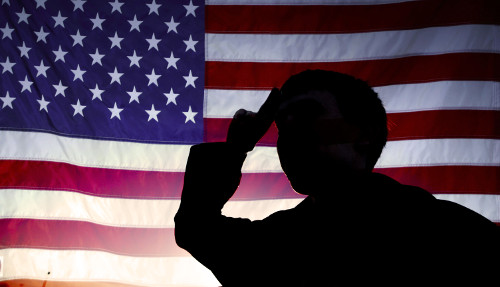By Stephen Cook
Student veterans discuss the transition from service to school
After serving in the armed forces, some veterans choose to go back to school. Here at the college, there are a number of students – and faculty – who been a part of the armed forces.
The college is the first school in Kansas to have its own VA worker on campus.
As a part of Veterans Week, the college hosted a panel on Nov. 13 featuring a number of various students and faculty who have served in the armed forces.
Panel speaker Billy Tope, who was in the United States Navy from December 1997 to July 2008, said due to the number of years he had served, it became more of a lifestyle than just a job. He currently works in admissions and is a student at the college.
Now, having a simple conversation can be difficult mainly because you become accustomed to the way you address certain individuals, communicating and not using acronyms – it was a different way of thinking, he said.
However, transitioning into the college lifestyle, working at the school and being a student, wasn’t a very big change for Tope.
“In the military everyone is a trainer and a trainee all the time,” Tope said. “You’re constantly training for something.”
Also present at the panel was John Russell, student, who was in active navy duty for about six years. He said he now has a different approach and an attention to detail in the classroom.
“Compared to a long time ago, when I tried going to college the first time, I’m definitely a lot more focused this time — a lot more motivated than I used to be,” Russell said.
With his background as experience abroad, he encourages getting to know veterans in the classroom. Just don’t assume anything and don’t be concerned about talking to veterans, Russell said.
“If anybody ever has a question or just wants to talk, don’t ever feel like you should be afraid to walk up to one of us,” he said. “We’re not going to rip your head off.”
The right way to ask a question or knowing the questions not to ask at all, is something Chris Hines, student and veteran, said he would like for his classmates to know about. Hines, who served in the Army for four years as well as the National Guard for two years, has been deployed to Iraq and Afghanistan during his service.
“I’ve had two or three kids come up and ask if I’d ever killed anybody,” Hines said. “For me that would be equivalent to asking if anybody in here had gotten raped when they were a child. It’s that detrimental to me.”
Having come to the college after his time in service, 35 year-old student Josh Young, an Air Force veteran who served for 14 years, said he now has a different perspective in the classroom.
“I see a lot of younger people straight out of high school, they’re sleeping in class or whatever, they don’t appreciate the luxury of an education,” Young said. “When I see younger folks not appreciate what we have here in America that kind of upsets me a little bit, but then I have to realize that they haven’t seen the things that we’ve seen, so maybe they just don’t understand that.”
The topic of age in the classroom and workplace is another issue student veterans have to consider.
Coming back to civilian life, Tope has now had to deal with being older than both instructors and employers. In the work environment, he has had to remind himself that age doesn’t matter. In his first civilian job, his boss was almost 10 full years older than him.
“I always kind of had to tell myself that regardless of age, age really has absolutely nothing to do with experience or capability,” Tope said. “I always had to remind myself that I was the subordinate now.”
In addition to acclimating to age differences, Tope said his perspective on the world has been changed by his time serving.
The disciplines learned in the armed forces are an advantage that his military background has given him in the academic world. Additionally, his new world outlook has affected the way he thinks.
“There’s a whole world out there of cultures,” Tope said. “Just understanding how other people think and live and seeing just how terrible other places can be or how good they might be and everything in between.”
Additionally, for Young, what changed his outlook the most was the realization that stereotypes of Middle Eastern people did not hold true.
“I actually went over there and I got to meet the local everyday Middle Eastern people; they’re just like us.” Young said. “Even though they may be different culturally, we’re all the same as far as human beings and we just can’t have stereotypes on people. We’re all human beings.”
In addition to a changed worldview, the veterans present at the panel also had a different way of thinking about perceived problems.
Young said you should never take anything for granted.
It is important to remember that things can always get a lot worse, Tope said.
“If I work a nine or 10 hour day, I just continuously tell myself I’m going home everyday. I go home to my wife and my son every single day of the week,” he said. “I’m not on a ship in the middle of the Persian Gulf for seven or eight months […] It definitely helps make my life better just knowing how bad it really could be.”
For information about services available to veterans on campus, as well as details about the Veterans Club, visit: http://www.jccc.edu/veterans/
Contact Stephen Cook, editor-in-chief, at scook35@jccc.edu.






















